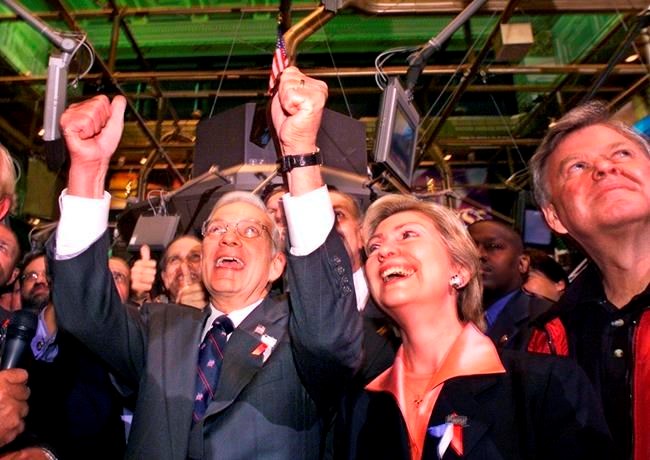Paul O’Neill, a former Treasury secretary who broke with George W. Bush over tax policy and then produced a book critical of the administration, died Saturday. He was 84.
O’Neill’s son, Paul O’Neill Jr. confirmed that his father died at his home in Pittsburgh after battling lung cancer for the last couple of years. After a few surgeries and chemotherapy, he decided against any further intervention four or five months ago, he said.
“There was some family here and he died peacefully,” the son said. “Based on his situation, it was a good exit.”
A former head of aluminum giant Alcoa, O’Neill served as Treasury secretary from 2001 to late 2002. He was forced to resign after he objected to a second round of tax cuts because of their impact on deficits.
After leaving the administration, O’Neill worked with author Ron Suskind on an explosive book covering his two years in the administration. O’Neill contended that the administration began planning the overthrow of Iraqi President Saddam Hussein right after Bush took office, eight months before the Sept. 11 terrorist attacks.
O’Neill depicted Bush as a disengaged president who didn’t encourage debate either at Cabinet meetings or in one-on-one discussions with Cabinet members. He said the lack of discussion in Cabinet meetings gave him the feeling that Bush “was like a blind man in a roomful of deaf people.”
He said major decisions were often made by Bush’s political team and
When the book, “The Price of Loyalty: George W. Bush, the White House and the Education of Paul O’Neill” came out in early 2004, Bush spokesman Scott McClellan discounted O’Neill’s descriptions of White House decision-making and said the president was “someone that leads and acts decisively on our biggest priorities.”
O’Neill said his purpose in collaborating on the book, for which he turned over 19,000 government documents to Suskind, was to generate a public discussion about the “current state of our political process and raise our expectations for what is possible.”
After leaving the Cabinet, O’Neill returned to Pittsburgh, where he had headed Alcoa from 1987 to 1999. He resumed working with the Pittsburgh Regional Health Care Initiative, a consortium of hospitals, medical societies and businesses studying ways to improve health care delivery in Western Pennsylvania. The subject had interested him since his days as a budget analyst in Washington with the Office of Management and Budget.
He also devoted time in retirement to projects that would deliver clean drinking water to Africa. As Treasury secretary, O’Neill had focused attention on poverty and combating diseases such as AIDS in Africa, touring the continent with Irish rock star Bono.
Before joining Alcoa, O’Neill had been president from 1985 to 1987 of International Paper Co., a firm he had joined in 1977 after leaving OMB.
After graduating with an economics degree from California State University in Fresno in 1961, O’Neill joined the Veterans Administration in Washington, working as a computer systems analyst. He later moved to OMB and rose to become deputy director of the budget agency from 1974 to 1977, providing budget guidance to then-President Gerald Ford.
It was at OMB that O’Neill developed close working relationships with Cheney, who served as Ford’s chief of staff, and Alan Greenspan, who was head of Ford’s Council of Economic Advisers. Greenspan was chairman of the Federal Reserve during the time O’Neill was Treasury secretary.
O’Neill’s blunt speaking style more than once got him in trouble as Treasury secretary, sending the dollar into a tailspin briefly in his early days at Treasury when his comments about foreign exchange rates surprised markets. In the spring of 2001, O’Neill jolted markets again when during Wall Street’s worst week in 11 years, he blandly declared “markets go up and markets go down.”
He was more focused on the traditional Treasury secretary’s job of instilling confidence during times of turbulence later that year when he led the effort to get Wall Street re-opened after the Sept. 11 terror attacks. O’Neill was also instrumental following the attacks in beefing up the government’s programs to disrupt financing to terrorist groups.
Martin Crutsinger And Ron Todt, The Associated Press

